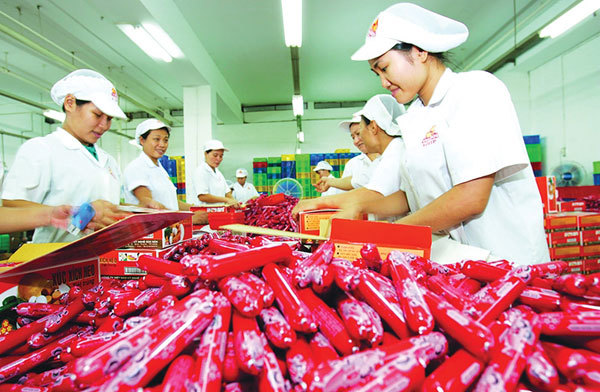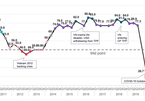 |
| European businesses started 2021 optimistic about Vietnam’s trade and investment environment. VIR Photo: Le Toan |
Just after two weeks since he was elected to be prime minister, Pham Minh Chinh signed and enacted Official Dispatch No.514/TTg-PL on reviewing and proposing amendments to legal regulations impeding investment and business activities and people’s lives. The dispatch, coming out amid a rise in business confidence nationwide and the government’s boosting its great efforts to continue creating a more business-friendly climate, was sent to ministers and other leaders of agencies, provinces, and centrally-ruled cities.
“As the country’s law system still boasts overlapped, inconsistent, and infeasible regulations unsuitable to the reality and obstructing investment and business activities and people’s lives, the prime minister requests ministers and heads of ministerial agencies, and chairpersons of provinces and centrally-ruled cities to expeditiously review and list regulations of the type in the existing legal documents,” reads the dispatch. “Concrete contents of the regulations and documents causing difficulties must be specified.”
Ministers and heads of ministerial agencies, and chairpersons of provinces and centrally-ruled cities are also requested to propose specific and feasible solutions in amending the regulations and documents, in a bid to “remove all difficulties, create synchronousness and feasibility of the law system, and contribute to mobilising all resources in the society for investment and business in service of the public and enterprises.” All results from reviews and listings, as well as proposals and solutions must be sent to the Ministry of Justice and the Government Office before May 15 before being reported to the government and the prime minister.
Expectations
Adam Sitkoff, executive director of the American Chamber of Commerce (AmCham) in Hanoi, has been expecting more improved policies in service of the business community as this would help Vietnam attract more investment and further strengthen enterprises’ confidence.
“The government’s efforts to improve the country’s competitiveness and business climate continue and I am optimistic about 2021. The business community continues to work with our partners in the government on ways to improve the business and investment climate and to attract new investment that will strengthen Vietnam’s post-pandemic economic recovery,” Sitkoff told VIR.
He suggested that it is necessary to accelerate the use of e-government, e-commerce, e-banking, fintech, hyperscale cloud computing, and the overall reduction of paper and cash for all businesses. Replacing Vietnam’s local cloud technical standards in state agencies with internationally-recognised cloud certification and compliance mechanisms and adopting cloud first policies will enable the government to choose the best technologies, strengthen digital resilience, and develop a robust e-government technology ecosystem.
Setting good policies that enable the use of mobile wallets and other electronic payment systems can help facilitate more productive e-commerce and reduce opportunities for corruption and fraud.
“We also need to ensure a favourable climate for existing investors and appreciate that the government has prioritised administrative reform to improve ease of doing business,” Sitkoff said. “It is critical that all companies and investors encounter a fair, transparent, predictable, and streamlined regulatory environment that values innovation – not only to attract new investment, but also to maintain and grow the investment that is already here.”
Meanwhile, a representative of US-backed Cargill in Vietnam told VIR that many firms like theirs are finding it challenging when it comes to policies. “Like other agri-businesses, Cargill is facing some difficulties in policy implementation. Specifically, legal changes are not keeping up with market changes: Vietnamese agriculture has been growing very fast in the past few years, as a result, some issues which have not yet been addressed in any current legal documentation are arising across production and business activities, causing not a few difficulties for enterprises,” the representative said.
The discrepancies in implementation of policies and co-ordination among some state bodies are confusing businesses, he added. “Some regulations have a rushing execution roadmap that makes it really hard for businesses to adapt their operations to the changes. This creates difficulties for well-complying businesses while creating a loophole for non-conforming ones. This is to some extent going against the government’s policy of creating a transparent, fair, and healthily competitive investment environment.”
Commenting on what the society and the business community needs amid the health crisis, Australian economist Raymond Mallon told VIR that an important aim of government support measures should be to stimulate increased domestic consumption and employment because this will improve social wellbeing while also helping stimulate overall domestic demand for goods and services provided by businesses.
“There is also scope for temporarily targeting support to workers and businesses in locations and sectors worst affected by COVID-19 such as those working in the hospitality and other close contact businesses, especially in regions with high concentrations of adversely impacted businesses such as the central coastal provinces,” he said.
According to Mallon, temporary support may also be needed for firms adversely impacted by COVID-19 that are providing essential services to society and businesses, such as health, education, transport, and logistics services. It is important to have clear and simple criteria for selection of businesses eligible for support to ensure that those most in need receive the support and to minimise opportunities for corruption, he added.
On the rise
It is expected that under the fresh order of the prime minister, ministers and other leaders around the country will take drastic action in reviewing and amending unnecessary regulations in favour of the business community, whose confidence is rising since early this year.
For example, European business leaders started 2021 positive and optimistic about Vietnam’s trade and investment environment, according to new data from the European Chamber of Commerce in Vietnam (EuroCham).
EuroCham’s Business Climate Index reached 73.9 points in the first quarter of 2021, also the highest score seen since the third quarter of 2019. When asked about the prospects of Vietnam’s business environment in the next quarter, 67 per cent predicted either ‘excellent’ or ‘good’ – a 12 per cent increase compared to the previous quarter.
Meanwhile, business leaders are also more optimistic about their own companies. About 68 per cent predict that their orders and revenue will ‘maintain or increase’ over the next three months, a 25-per-cent increase compared to the fourth quarter of 2020.
According to the General Statistics Office (GSO), in the first four months of 2021, the economy saw over 44,000 newly-established enterprises with total registered capital of VND627.7 trillion ($27.3 billion), employing just over 340,000 labourers – up 17.5 per cent in the number of enterprises, 41 per cent in capital, and 7.8 per cent in the number of labourers as compared to those in the same period of last year.
In particular, the average registered capital of each newly-established business in the four months of the year is VND14.3 billion ($617,000), up 20 per cent on-year. If an additional VND792.9 trillion ($34.47 billion) registered by around 14,900 operational enterprises is included, the total registered capital inserted into the economy in the period is VND1.42 quadrillion ($61.74 billion). Furthermore, the first four months also saw 19,300 enterprises resume operations, up 8 per cent on-year.
“These are very positive signals for the economy in the context that the pandemic remains very complicated, badly affecting enterprises’ business and production activities,” said a GSO report on the economy’s four-month economy.
“In the first four months, the number of newly-established enterprises is the highest in the same periods of the years from 2017-2020, and also the highest in all economic sectors,” said GSO general director Nguyen Thi Huong. “This showed that following the country’s implementation of the dual tasks of socioeconomic development and fighting against the pandemic, the business community’s confidence in the economic development directions and policies of the Party and the government in the 2021-2025 tenure is rising. This is also quite a positive signal for enterprise development outlook in the time to come.”
For Sitkoff from AmCham in Hanoi, this kind of sentiment will keep rising, though much remains to be done by the Vietnamese government for a better business climate.
“Another area that greatly impacts both foreign and domestic businesses is the tax system – although Vietnam’s tax rate of 20 per cent is competitive, filing and paying taxes here is still too high a burden compared to neighboring countries,” Sitkoff explained. “In addition, too many companies are also suffering from what seem to be unfair and non-transparent audits and reassessments or are losing their incentives when a law or an interpretation changes.”
VIR

Confidence in Vietnam’s business environment continues to rebound
European business leaders began the year positive and optimistic about Vietnam’s trade and investment environment, according to new data from the European Chamber of Commerce in Vietnam (EuroCham).

European businesses’ confidence on Vietnam outlook reaches highest since Covid-19 emergence
Vietnam is on the right path to achieving its twin goals of protecting health and promoting economic growth, stated Chairman of the European Chamber of Commerce in Vietnam (EuroCham).